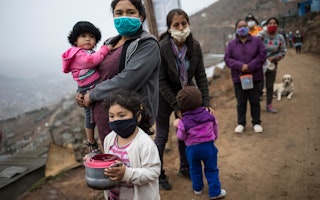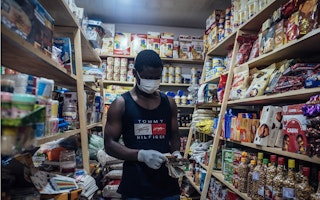For Essential Workers, Labor Rights Are Essential
By Roxanne Nazir & Cindy Berman

Since the COVID-19 pandemic was declared in March 2020, we have seen some remarkable developments in the fight for the labor rights of essential workers. This is in no small part related to the fact that many of us have finally understood and recognized the critical role essential workers play in our communities, in our economies, and in our lives.
No matter what the job—be they care workers, waste-pickers, street vendors, or agricultural workers—we now know who essential workers are. We have clapped for them. We have advocated for them on our social media. We have been dismayed by the risks they have taken, and the lack of protection they have endured, in order to make sure that many of us continue to receive their care, and the services they provide.
Justina Kgoele is a grandmother and a mother and the main breadwinner for her family of seven. She works as a waste picker in Johannesburg’s vast Marie Louise landfill, where she spends 12 hours a day, six days per week, doing the essential work of picking through the garbage and ensuring that items that can be recycled are recycled: work that is critical if we are to repair our planet. In late March 2020, the South African government imposed a strict lockdown. People who weren’t classed as essential workers, including waste pickers, had to stay at home.
Unable to cover basic costs such as food, water, and electricity, Justina’s family faced destitution. Their experience echoed many other households in South Africa and globally, which have been captured by Women in Informal Employment: Globalizing and Organizing (WIEGO).
However, Justina was a member of the African Reclaimers Organization (ARO), a workers’ organization founded in 2018 to bring together street and landfill waste pickers. The African Reclaimers Organization organized its members and sent a petition to the minister of environment, advocating for waste pickers to return to work and arguing that they were providing essential services vital to the health and hygiene of their communities. As a result of this pressure, restrictions were eased, and waste pickers returned to work in May 2020.
Other examples abound.
In Chile, the International Domestic Workers Federation and its affiliates played a key role in the government’s decision to pass a law to include domestic workers in unemployment benefits. In Nigeria and Senegal, StreetNet helped forge agreements between street traders and city governments tied to the provision of emergency support for workers.
In Thailand, a new partnership has been formed between the Thai government and HomeNet Thailand allowing for the extension of cash transfers to informal workers, and forging a first-ever consultation mechanism between government and informal worker organizations at the front-end of recovery policy design.
In the United States, meanwhile, the state of New York became the first state to include undocumented workers in state relief for COVID-19-related income loss. And in Poland, care workers at a nursing home who had been forced to work long shifts during lockdown won their right to go home after 10 days, with support from UniGlobal Union.
Still, more must be done.
A recent ILO report shows 55 percent of the global population has no access to any form of social protection, yet the COVID-19 crisis surfaced the urgency of social protection as a necessary condition to reduce poverty, inequality, insecurity, and avoidable illness. Without social protection, especially for low-paid workers in precarious jobs, we will see continued wealth and power disparity across the globe.
Workers who perform our essential services tend to be women, migrants, or from marginalized and discriminated communities. They are most often poorly paid and undervalued. Critical as their work is to our daily lives, these workers have been largely invisible. They work behind closed doors as domestic workers and home-based workers, working at night and in the early hours cleaning office buildings and streets. They are more likely to be subject to sexual harassment and violence at work and in their communities. They work in the informal economy or on precarious contracts and lack access to safety nets and basic services such as health care. Many are migrants with limited rights and legal status where they live and work.
Open Society is supporting a global Essential Workers Campaign to build on the recognition of essential workers for the role they have played throughout this pandemic. We know too well that memories are short, and that actions speak louder than words. The gains made by workers’ organizations in response to the Covid pandemic are temporary. They must become permanent, and they must be expanded.
Our partners are organizing and advocating for workers around the world. Through this campaign, we will support them in their work to ensure that essential workers are recognized as equal partners in the economic recovery and that this is, in fact, #Essential4Recovery.
Until November 2021, Roxanne Nazir was a program officer at the Open Society Economic Justice Program.
Until January 2022, Cindy Berman was a team manager for the Open Society International Migration Initiative.


